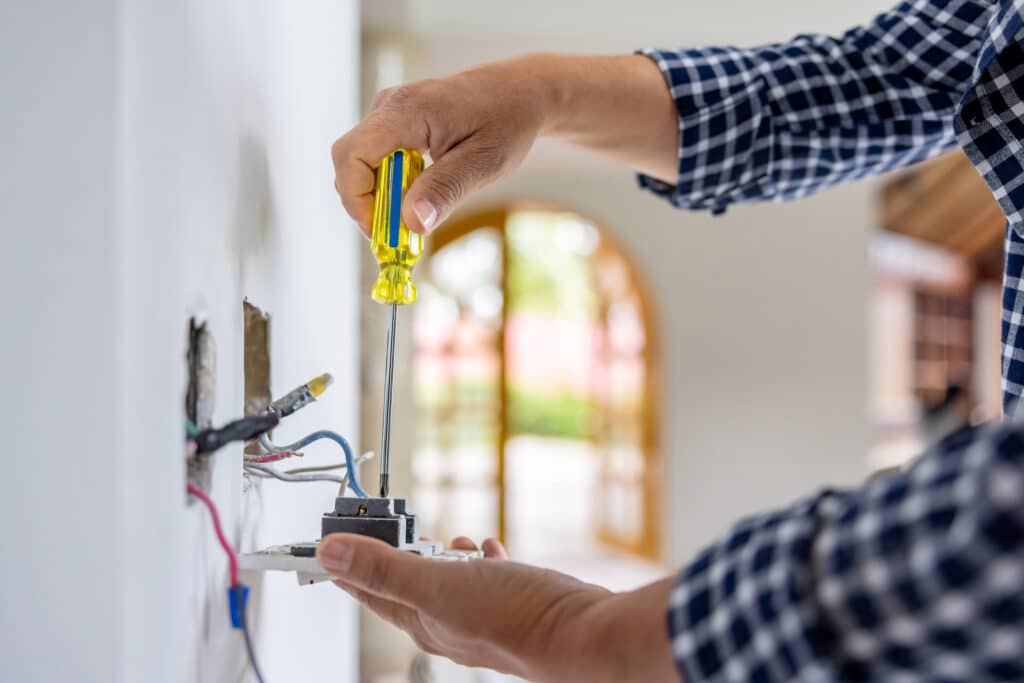Upgrading electrical wiring is crucial to prevent electrical hazards, improve safety, and maintain efficiency. Signs that you might need an upgrade include frequent circuit breaker trips, flickering or dimming lights, and outlets that feel warm or emit burning smells. Older homes with outdated aluminum or knob-and-tube wiring are particularly at risk. Upgrading improves energy efficiency, enhances home value, and reduces the risk of fires. Always consult a licensed electrician for inspections and upgrades to ensure your home is safe and up-to-date.

Wondering if your electrical wiring is up to date? Maybe your lights flicker, or your breaker trips more than it should. These are signs that your home’s wiring might need an upgrade.
Electrical systems are one of those things we often overlook until something goes wrong, but keeping your wiring updated is super important for safety and efficiency.
Whether you live in West Columbia, Lexington, Irmo, or Columbia, knowing when to upgrade your electrical wiring can save you from bigger problems down the road. Let’s dive into everything you need to know!
What is Electrical Wiring?
Electrical wiring is the system of wires that delivers electricity to every part of your home. It runs behind your walls, connecting your electrical panel to your outlets, switches, lights, and appliances.
Without good wiring, your home’s electrical system can’t function properly, which could lead to some serious problems.
Over time, wiring can wear out, become outdated, or even get damaged, which is why it’s important to know what type of wiring you have and how it’s holding up. Upgrading your electrical wiring ensures that your home is both safe and energy-efficient.
Types of Electrical Wiring
Understanding the different types of electrical wiring can help you know what might be in your home and whether it’s time for an upgrade.
Some wiring types are more modern and safe, while others are outdated and could pose risks. Whether your home is older or newer, the wiring type affects its safety and efficiency.
Copper Wiring
Copper wiring is the gold standard when it comes to modern homes. It’s known for its durability and excellent conductivity, meaning it carries electricity efficiently.
Copper wiring doesn’t corrode easily, making it a safer option for long-term use. It’s also more heat-resistant than other wiring types, reducing the risk of overheating or fires.
If your home has copper wiring, it’s likely up to current safety standards, but it’s still good to have it inspected regularly.
Aluminum Wiring
Aluminum wiring was commonly used in homes during the 1960s and 1970s because it was cheaper than copper. While it gets the job done, it’s known to be less stable over time. Aluminum expands and contracts with heat, which can cause loose connections and increase the risk of fires.
If your home has aluminum wiring, it might be time to upgrade to something safer, like copper. A professional electrician can inspect your wiring to see if it’s safe to keep using or if you should consider replacing it.
Knob-and-Tube Wiring
If your home was built before the 1950s, it might still have knob-and-tube wiring. This old system consists of wires running through ceramic knobs and tubes, but it lacks the grounding wire modern systems have.
This makes it much more dangerous, especially for handling modern electrical loads. Knob-and-tube wiring is also more prone to wear and tear, increasing the risk of electrical fires. If you live in an older home and haven’t upgraded your wiring, it’s probably a good idea to do so soon.
Non-Metallic (NM) Cable
Non-metallic (NM) cable, often called Romex, is the most common type of wiring used in modern homes. It consists of insulated wires wrapped in a plastic sheath, making it safer and easier to install.
NM cable is great for residential use because it’s affordable, flexible, and works well in dry indoor locations.
If you have a newer home, you likely have NM cable wiring, which is considered up-to-date and reliable. However, like any system, regular inspections are a good idea to ensure everything is functioning properly.
Armored Cable (BX)
Armored cable (BX) is another type of wiring that you might find in older homes, although it’s still used today in certain situations. It consists of wires wrapped in a metal casing, which helps protect them from physical damage.
BX wiring is typically used in locations where wires need extra protection, like in walls or underground. While it’s durable, it can be tricky to work with, and if your home has this wiring, it’s worth getting it inspected to ensure it’s still in good condition.
Signs You Need to Upgrade Your Electrical Wiring
Knowing when to upgrade your electrical wiring can prevent bigger problems down the road. Ignoring the signs of faulty wiring can lead to expensive repairs or even safety hazards like fires.
Fortunately, your home will often give you clues that the wiring needs attention. If you’re experiencing any of the following issues, it might be time to consider upgrading your system. Whether you live in West Columbia, Lexington, Irmo, or Columbia, paying attention to these signs can save you a lot of trouble in the long run.
Frequent Circuit Breaker Trips
If your circuit breaker trips often, it could be a sign that your wiring is outdated or struggling to handle the electrical load in your home. While it’s normal for a breaker to trip occasionally, frequent trips indicate a bigger problem.
This can happen when too many appliances are pulling power from a circuit, or it could mean that the wiring is faulty. Ignoring this issue can lead to overheating and possibly electrical fires, so it’s a sign you shouldn’t ignore.
Flickering Lights
Flickering lights are more than just an annoyance—they can be a sign of loose or damaged wiring. If your lights flicker when you turn on an appliance, it means that your wiring isn’t distributing electricity evenly.
This could be due to old, worn-out wiring or a lack of proper grounding. Either way, flickering lights are a warning that you should have your wiring inspected and possibly upgraded to prevent bigger issues.
Dimming Lights When Using Appliances
If your lights dim when you use appliances, it’s another sign that your wiring might not be able to handle the load. This usually happens when large appliances like air conditioners or microwaves draw too much power from the same circuit.
While it may seem like a small inconvenience, it could point to an overloaded electrical system that needs to be upgraded to handle modern appliances safely.
Old Wiring Systems
Homes built before the 1970s might still have old wiring systems, like aluminum or knob-and-tube wiring. These outdated systems are not only less efficient but also more dangerous.
They weren’t designed to handle the electrical demands of today’s technology, which means they can overheat and cause fires. If your home has one of these old wiring systems, it’s essential to get it inspected and upgraded to modern wiring for your safety.
Burning Smells or Discolored Outlets
If you ever notice a burning smell coming from your outlets or see discolored outlets, it’s a serious warning sign. This often happens when wiring overheats or becomes damaged, which can easily lead to an electrical fire.
Burnt or discolored outlets mean that the wiring behind them is likely faulty or overloaded. If you experience this, turn off the power and call an electrician immediately to inspect your system and prevent further damage.
Benefits of Upgrading Electrical Wiring
Upgrading your electrical wiring might seem like a big project, but the benefits far outweigh the hassle. It not only improves your home’s safety, but it can also enhance your overall quality of life. Outdated wiring can cause all sorts of problems, from electrical hazards to inefficient energy use.
When you upgrade, you’ll see improvements in how smoothly things run and even increase your home’s value. If you’re in West Columbia, Lexington, Irmo, or Columbia, upgrading your wiring can make a huge difference in safety and efficiency.
Improved Safety
The most obvious benefit of upgrading your wiring is improved safety. Old or damaged wiring is one of the leading causes of house fires. By upgrading to modern wiring, you reduce the risk of overheating, electrical shorts, and potential fires.
New wiring systems also include proper grounding, which makes them much safer for today’s high-powered electronics and appliances. Simply put, upgrading your wiring ensures that your home is safe for you and your family.
Increased Home Value
An electrical wiring upgrade can significantly increase your home’s value. Buyers are more likely to pay a premium for a home with up-to-date electrical systems, especially when it comes to older homes.
Outdated wiring can be a red flag for buyers, who might worry about the cost of upgrading it themselves. Having modern wiring can make your home more attractive to potential buyers and give you an edge in the competitive housing market.
Better Energy Efficiency
Upgrading your wiring can lead to better energy efficiency throughout your home. Older wiring systems are often less efficient and can waste electricity, leading to higher utility bills.
Modern wiring is designed to handle today’s appliances and devices more effectively, which can lower your energy consumption and save you money in the long run. Plus, with newer systems, you’ll experience fewer interruptions, like flickering lights or tripped breakers.
The Wiring Upgrade Process
Upgrading your electrical wiring might sound like a big task, but with the right steps, it can be a smooth process. Knowing what to expect can help ease any stress you may have.
Whether you’re just starting to think about upgrading or you’re ready to begin, understanding the wiring upgrade process is important.
From the initial inspection to the final installation, working with a professional ensures the job is done safely and efficiently. Here’s what you can expect when upgrading your wiring, especially in areas like West Columbia, Lexington, Irmo, or Columbia.
Getting a Professional Inspection
The first step in the wiring upgrade process is to get a professional inspection. A licensed electrician will come to your home and evaluate your current wiring system.
They’ll check for signs of wear and tear, outdated wiring types, or any safety hazards. This inspection will give you a clear understanding of what needs to be replaced and why. It’s always best to have a professional handle this step, as they can spot issues that might not be obvious to the untrained eye.
Planning the Upgrade
Once the inspection is complete, it’s time to start planning the upgrade. This involves working with your electrician to figure out what materials and systems will be needed.
They’ll help you decide on the best type of wiring for your home, taking into account your electrical needs and local building codes. During this phase, you’ll also discuss the timeline and cost of the project, ensuring you’re prepared for the work ahead.
What to Expect During the Upgrade
During the upgrade process, your electrician will replace old wiring with new, safer systems. Depending on the size of your home and the extent of the upgrade, this can take a few days to a week or more.
You may need to temporarily shut off power to certain parts of the house, so it’s a good idea to plan. While this might seem inconvenient, it’s a necessary part of ensuring everything is installed properly and safely.
Your electrician will keep you informed every step of the way, so you know exactly what’s happening.

Electrical Wiring Safety Tips
Keeping your electrical wiring safe is crucial for the well-being of your home and family. Even after upgrading, it’s important to maintain your wiring and follow safety guidelines to avoid future issues.
Simple steps like not overloading your circuits or recognizing early warning signs can help prevent dangerous situations.
Whether you live in West Columbia, Lexington, Irmo, or Columbia, these safety tips will help you keep your home’s electrical system in top shape. Let’s explore some essential practices to ensure your wiring stays safe over time.
Avoid Overloading Circuits
One of the most common causes of electrical problems is overloading circuits. This happens when you plug in too many devices or appliances into a single outlet or circuit.
Overloaded circuits can cause wires to overheat, leading to tripped breakers or even fires. To avoid this, spread out the use of high-power appliances across different circuits and avoid using too many extension cords or power strips.
Regular Maintenance Checks
Just like other parts of your home, your electrical wiring needs regular maintenance checks to ensure everything is working properly.
Wiring can wear out over time, especially in older homes, so it’s important to stay on top of any potential issues. Here’s what you can do to keep your wiring safe:
- Schedule inspections: Have a licensed electrician inspect your electrical wiring system every few years.
- Look for warning signs: Check outlets and switches for discoloration, buzzing sounds, or loose connections.
- Test your breakers: Ensure your circuit breakers aren’t frequently tripping, which could signal a wiring issue.
- Replace damaged wiring: Worn or damaged electrical wiring should be replaced immediately to prevent fire hazards.
These routine checks can catch small problems early, keeping your electrical wiring safe and reliable.
Recognizing Warning Signs Early
Paying attention to the warning signs of faulty wiring can help you catch issues before they escalate. Flickering or dimming lights, frequent breaker trips, or outlets that feel warm to the touch are all red flags.
If you notice any of these signs, it’s important to call an electrician right away to inspect your wiring. Catching these problems early can prevent larger, more costly repairs in the future.
Don’t Wait Until It’s Too Late – Upgrade Your Wiring Today!
Is your home’s electrical wiring keeping up with modern demands? Mister Sparky of Columbia is here to help you stay safe and efficient. Serving West Columbia, Lexington, Irmo, and Columbia, we specialize in professional electrical upgrades.
Contact us today to schedule an inspection and ensure your home is up to code before small issues turn into big problems!
FAQs About Upgrading Electrical Wiring
How long does the electrical wiring upgrade process take?
The length of time it takes to upgrade your electrical wiring depends on the size of your home and the complexity of the project. In general, it can take anywhere from a few days to a week or more. Homes with older systems or those needing a full rewire will take longer, but your electrician will give you a detailed timeline during the planning stage.
Can I upgrade the electrical wiring myself?
It’s highly recommended that you do not try to upgrade your electrical wiring yourself. Electrical work can be dangerous and requires a licensed professional to ensure it’s done correctly and safely. DIY electrical work can lead to serious safety risks, including electrical fires, and may not meet local building codes.
How much does it cost to upgrade electrical wiring?
The cost of upgrading your wiring varies depending on the size of your home, the type of wiring being replaced, and local labor rates. On average, homeowners can expect to spend a few thousand dollars for a complete upgrade, but getting a professional inspection will give you a more accurate estimate based on your specific needs.
What happens if I don’t upgrade the old wiring?
If you don’t upgrade old wiring, you’re putting your home at risk for electrical hazards. Old systems like aluminum or knob-and-tube wiring are not equipped to handle modern electrical loads and can lead to overheating, electrical shorts, or even fires. Additionally, outdated wiring can affect the resale value of your home.
Will upgrading my wiring increase my home’s energy efficiency?
Yes, upgrading to modern wiring can improve your home’s energy efficiency. Older wiring systems tend to waste electricity due to poor conductivity or degraded materials. Newer wiring, especially copper, is much more efficient and better suited to handle today’s energy demands, which can lower your energy bills over time.




